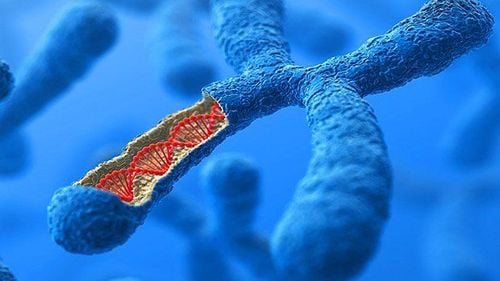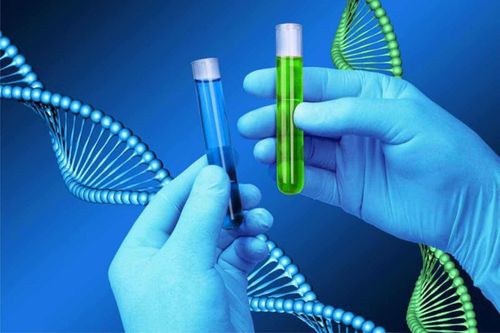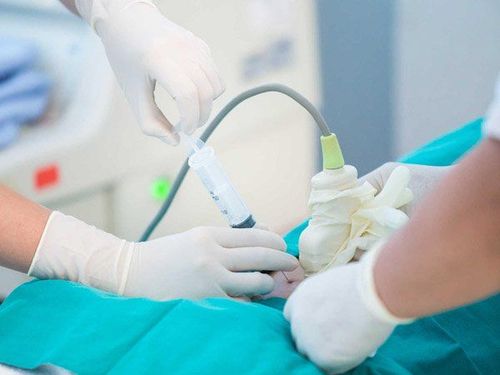This is an automatically translated article.
Genetic testing, also known as DNA testing, is a type of medical test that identifies changes in chromosomes, genes, or proteins. Genetic test results can confirm or rule out an inherited disease, help identify a person at risk of development, the ability to pass on genetic disorders to the next generation, determine ancestral DNA. More than 1,000 DNA tests are currently in use and more are still being developed.
1. Meaning of DNA test results
Genetic testing plays an important role in determining the risk of developing certain diseases as well as screening for and sometimes treating diseases. Different types of genetic testing will be done in different specific cases such as:
Diagnosis of disease. If the person has symptoms of a disease that can be inherited or the person's DNA, sometimes called a mutated gene, genetic testing can detect whether the disease is caused by a genetic mutation. For example, genetic testing may be used to confirm a diagnosis of cystic fibrosis (CF) or Huntington's disease. Predictive and presymptomatic testing. If a healthy person has a family history of a genetic disease, genetic testing before he or she has symptoms can show how at risk of developing that genetic disease. For example, this type of test is useful for determining your risk of certain types of colorectal cancer. Carrier testing. If a person has a family history of a genetic disorder - such as sickle cell anemia or cystic fibrosis - or he or she is in an ethnic group at increased risk for a particular genetic disorder, he or she may choose to have genetic testing before having children. Carrier screening tests can detect genes associated with a variety of diseases and mutated conditions and can determine if the person and his/her fiancé are carriers of the mutated gene. genetic disease or not. Pharmacokinetics. If a person has a special health condition or disease, this type of genetic test can help determine what type of medication and dosage will be most effective and beneficial for that person. Prenatal testing. If you're pregnant, tests can detect certain types of abnormalities in your baby's genes. Down syndrome and trisomy 18 syndrome are two genetic disorders that are commonly screened for prenatally. Accordingly, to detect these diseases, it is done by looking for markers in the blood or by invasive tests such as amniocentesis. Today, a maternal blood test is used to find free fetal DNA (cffDNA - cell free fetal DNA). Newborn screening. This is the most common type of genetic test. In the United States, all states require newborns to be screened for genetic abnormalities and metabolic diseases. This type of genetic testing is important because if the results show that the child has a disorder such as congenital hypothyroidism, sickle cell disease, or phenylketonuria (PKU), care and treatment for the child can be done. show up immediately. Pre-implantation genetic testing (PGT) is a technique used in reproductive medicine to identify genetic abnormalities in embryos (less commonly the polar form of embryos). eggs) produced through in vitro fertilization. DNA testing (DNA testing, DNA testing) is a type of molecular biology test through the analysis of genetic data for a specific purpose such as blood DNA test results, individual identification, This particular test is not new in Vietnam because it has long been used in criminal science to track down the culprit, confirm or deny a license. biological evidence, identify the victim...

Xét nghiệm tiền sản có thể giúp sàng lọc hội chứng Down trước sinh
2. Risks of doing a DNA test
In general, a DNA test poses little physical risk to the person being performed. Patient samples such as Oral mucosal cell samples, blood samples, Legs (root) hair (hair, beard), fingernails (legs), umbilical cord ... almost no risk. However, prenatal testing such as amniocentesis or chorionic villus sampling or chorionic villus sampling (CVS) carries a risk of miscarriage.
Genetic testing can also carry emotional, social and financial risks. The best performer should discuss all the risks and benefits of DNA testing with a doctor, medical geneticist, or genetic counselor prior to having it performed.
3. What to prepare before taking a DNA test
Before taking a DNA test, gather as much information as you can about your family's medical history. Then, talk to your doctor or a genetic counselor about your and your family's medical history so they can better understand your risk and type of disease for you and your future generations.
If testing for a family genetic disorder is desired, the person should consider discussing the decision with family members. Having these conversations before the test can let you know how your family members feel about the DNA test results and how the DNA test results affect them.
Not all health insurance policies pay for DNA testing. So, before having one, check with your insurance provider to see what tests will be covered.
4. Types of patient samples in DNA testing
Depending on the type of test, a sample of the person's blood, skin, amniotic fluid, or other tissue will be collected and sent to a laboratory for analysis.
Blood sample. The medical staff will take a sample using a needle and draw blood from a vein in the arm of the person to be tested. For newborn screening tests, a blood sample will be taken by pricking the baby's heel. Samples of oral mucosal cells. For some tests, a sample of the oral mucosa is taken from the inside of the person's cheek for a DNA test. Invasive fetal DNA testing is also known as traditional amniocentesis. The sample used for the test is cells taken from the amniotic fluid. This method must have the support of a specialist to avoid risks to the fetus. A placental biopsy or chorionic villus sampling (CVS) is a medical technique that takes a sample of cells that are the chorion that surrounds the embryo, also known as the placenta.
5. Read DNA test results

Bác sĩ hỗ trợ bệnh nhân tìm ra giải pháp tốt nhất cho mỗi trường hợp
5.1. Positive result If the genetic test result is positive, it means that the person has a genetic disease. The next steps after receiving a positive result will depend on the reason for the DNA test. If the purpose is to:
Diagnose a specific disease or health condition, the results of a DNA test will help your doctor determine an appropriate treatment and management plan for the disease. Find out if you carry a disease-causing gene to pass on to your child, and with a positive DNA test, a doctor, medical geneticist or genetic counselor can help you determine your child's risk. Did I really develop the disease? Test results can also provide information to consider when you and your spouse make decisions about having children later. Determine if the person may have a certain disease however a positive test does not necessarily mean that the person will develop the disorder. For example, having a breast cancer gene ( BRCA1 or BRCA2 ) means that a person has an increased risk of developing breast cancer at some point in their life, but it does not mean that it is certain that the person will develop breast cancer. breast letter. However, with some other diseases, such as Huntington's disease, a mutation in the gene is certain that the disease will eventually develop. Talk to your doctor about what a positive result means for you and your family. In some cases, people can make lifestyle changes that can reduce their risk of developing the disease, even if there are genes that make them more susceptible. DNA test results can also help the person make choices regarding treatment, family planning, career, and insurance.
5.2. Negative result A negative result means that the mutated gene was not detected by the test, which can be reassuring, but it is not a 100% guarantee that the person will not later get sick from the gene mutation again. The accuracy of DNA tests to detect mutated genes varies, depending on the condition being tested for and whether the gene mutation has been previously identified in a family member.
Even if there is no mutated gene, it does not necessarily mean that the person will never get the disease. For example, the majority of people with breast cancer do not have the breast cancer gene (BRCA1 or BRCA2). In addition, genetic testing may not be able to detect all genetic defects.
5.3. Indeterminate results In some cases, genetic testing may not provide useful information about the gene being tested. Everyone has variations in their genes, and usually these variations don't affect the person's health. But sometimes it can be difficult to distinguish between a disease-causing gene and a harmless gene variant. In these situations, follow-up testing or periodic evaluation of genes over time will be very useful for early detection of truly pathogenic genetic mutations later in life.
Please dial HOTLINE for more information or register for an appointment HERE. Download MyVinmec app to make appointments faster and to manage your bookings easily.
The article references the source: Mayoclinic.org; ghr.nlm.nih.gov












